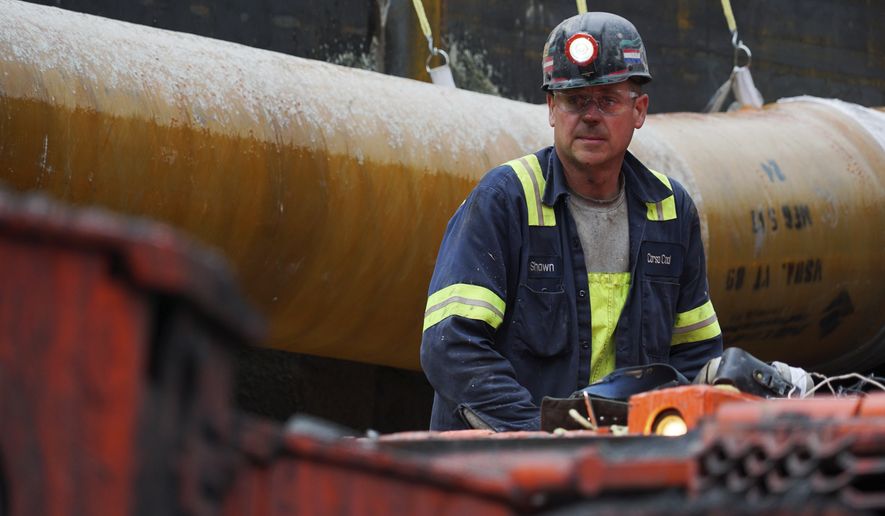As France, Germany and Italy chastised President Trump for rejecting the Paris climate accord in June and mocked the U.S. for turning its back on the environment, their nations were busy importing record amounts of American coal.
The U.S., federal data show, is seeing something of a coal renaissance, but the boom — partly the result of Mr. Trump’s aggressive policies to roll back Obama-era regulations on the fuel — largely has benefited foreign markets. Some of the biggest buyers are also the biggest critics of the Trump administration’s climate policy, including China and leading European nations that now claim to be the world’s leaders on fighting global warming.
The U.S. last year produced 773 million short tons of coal, 45 million more than 2016. That was the largest year-to-year increase in nearly two decades, government numbers show.
But that didn’t equal increased use at home, with more coal than ever heading overseas.
“Even though U.S. coal consumption decreased, higher worldwide demand for U.S. coal led to greater coal production,” the federal Energy Information Administration said in a recent report.
Indeed, the U.S. consumed 719 million short tons of coal last year, a drop of 12 million from 2016.
Total exports in 2017, however, shot up to 95 million short tons, a 58 percent increase over the previous year. About 31 million short tons of that went to Asia, nearly double the amount from 2016. China alone imported 2.8 million short tons through September 2017 — a wild increase over the previous year’s 205,000.
Total exports to Europe reached 40 million short tons — 13 million more than in 2016.
Some of the most fertile markets in Europe are nations with leaders that have been the most outspoken in bashing Mr. Trump for pulling out of the global Paris climate pact, an Obama-era agreement that the current administration says unfairly punished the U.S. while letting major polluters such as China off the hook.
Chief among the critics has been French President Emmanuel Macron. Among other instances, Mr. Macron in December mocked Mr. Trump by launching the “Make Our Planet Great Again Awards,” a spin on the president’s famous campaign slogan. He gave grants to U.S. scientists to continue their research in France and said his country was leading the way in clean energy and carbon emissions reductions.
“France and Europe will be the place where we will decide how to make our planet great again,” he said at a ceremony announcing the awards.
At the same time, his country was in the midst of a huge uptick in American coal imports.
Through September 2017, France imported 1.5 million short tons of American coal — double the amount in 2016.
Mr. Macron hasn’t been alone in his criticism of Mr. Trump or the seeming hypocrisy when it comes to coal, which most scientists believe is one of the biggest man-made contributors to climate change. Last summer, France, Germany and Italy released a joint statement saying the U.S. would never be welcomed back into the Paris climate accord, effectively trying to isolate the Trump administration on the world stage.
“We firmly believe that the Paris Agreement cannot be renegotiated,” the nations said in a joint statement, expressing “regret” with the course Mr. Trump chose.
But Mr. Macron’s allies in that attack also have taken advantage of U.S. coal.
Through September, Germany imported 3.4 million short tons, compared with 2.5 million in 2016. Italy brought in 2.2 million tons of U.S. coal during the same period; in 2016, it imported just 1.3 million.
As a whole, Europe through September imported 28.4 million short tons, compared with 19.3 million the previous year, federal data show.
Leading Republicans on Capitol Hill say the figures prove that many so-called leaders on climate change simply can’t back up their words with action.
“While France, Germany and Italy were quick to criticize President Trump for pulling out of the Paris agreement, their increased purchase of American coal shows they clearly recognize that you can’t run an economy on wind and solar power alone. You need fossil fuels,” Sen. James M. Inhofe, Oklahoma Republican, told The Washington Times.
“I’m pleased we’re on track to becoming a net energy exporter again. American energy dominance will pay dividends for our economy and our national security,” he said.
There are other signs of reality setting in when it comes to climate policy. France late last month said it would revise its carbon emissions targets after falling short of its goals in 2016, Reuters reported.
It aimed to cap carbon emissions at 447 million tons, but its actual pollution was 3.6 percent higher.
• Ben Wolfgang can be reached at bwolfgang@washingtontimes.com.




Please read our comment policy before commenting.